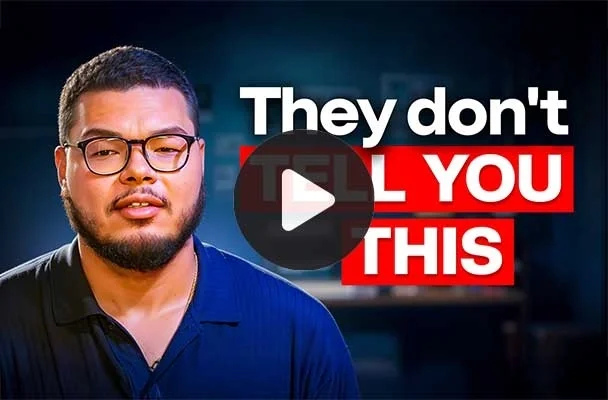
Why Budgeting Feels So Hard After the Military
Struggling to manage your money after the military? You're not broken. You're not lazy. You're not stupid. You were trained for war, not rent negotiations and grocery budgets. Civilian budgeting is a totally different battlefield—and you’ve had zero prep.
In fact, about 200,000 service members transition to civilian life each year, and the data shows this transition is harder than ever. Over 60% of post-9/11 veterans report difficulty adjusting to civilian life, compared to just 25% of veterans from earlier eras.
Military life systematically eliminated most financial decision-making from your daily routine. Now you're expected to master complex budget management with zero training. That's not a character flaw. That's a predictable outcome.
Now let's break this down and get your finances under control.
The Military Financial Safety Net You Didn’t Realize You Had (Because You Never Had to Think About It)
You Never Had to Think About Housing
In the military, housing wasn’t a decision, it was a given. You didn’t have to haggle with landlords or worry about utility bills. You had quarters, orders, and simplicity.
Now? You're suddenly responsible for evaluating neighborhoods, negotiating leases, managing utility contracts, budgeting for repairs, and handling security deposits. The average civilian spends 30% of their income on housing. You never had to think about that percentage before. Welcome to civilian life.
Food Costs Were Predictable and Subsidized
Dining facilities and commissaries provided meals at heavily subsidized rates. You never had to wonder what was for dinner, comparison shop for groceries, or factor in food waste. Restaurant expenses were minimal because most meals were provided.
Today? You’re meal planning, price comparing, and wondering if takeout three nights a week is killing your budget (spoiler: it is).
The "Set and Forget" Financial Structure
Military pay was automatic and predictable. Retirement contributions happened without your input through systems like the Thrift Savings Plan. Healthcare was comprehensive and free at the point of service.
Here's what that really means: You never had to research health insurance plans, compare premiums and deductibles, or budget for medical expenses. You never had to decide how much to save for retirement or which investment options to choose. The military made those decisions for you.
Fewer Bills, Less Complexity
Base life eliminated dozens of civilian expenses. No separate internet, cable, or gym memberships. No multiple streaming services, separate car insurance negotiations, or utility company selections. Your financial life was streamlined by design.
The typical civilian manages 15-20 different monthly bills and subscriptions. You went from maybe 3-5 financial obligations to suddenly tracking and budgeting for everything.
Why Traditional Budgeting Advice Falls Short for Veterans
Most budgeting advice assumes you already understand concepts like variable expenses, emergency funds, and debt management. It assumes you've been paying rent, managing utilities, and making healthcare decisions for years.
You haven't. You were busy serving your country while other people were learning these skills through trial and error.
Traditional budgeting advice also treats money management like it's intuitive. For veterans, it often feels restrictive and controlling. That's the opposite of the freedom you thought civilian life would provide. This isn't a character flaw. It's a normal response to suddenly having to micromanage every dollar when you're used to broader autonomy in other areas.
The numbers prove this struggle is real. Consumer Financial Protection Bureau data shows that many young veterans become delinquent on debt payments in their first year after separation, particularly on auto loans, credit cards, and personal loans. Meanwhile, 61% of veterans with post-traumatic stress report trouble paying bills in their first few years out, compared to 30% of veterans without PTS.
A Veteran-Friendly Approach to Building Your First Budget
Reframe Budgeting as Mission Planning
Stop complaining about “feeling restricted” by a budget. You want freedom? Then you need to get your money in order. A real budget doesn’t trap you—it unleashes you. It puts you in command of every dollar like it’s a boots-on-ground operation.
With a budget that’s done right, every one of your dollars gets a specific assignment, just like personnel in a military operation. You get to decide what’s actually important to you. If saving for retirement is more important than eating out all the time, then you make that choice in your budget. If paying off your debt is a smarter decision than living in the nicest area in town, then that’s where you allocate your money. If going on a vacation excites you more than a new car, that’s your decision. You're creating a strategic plan to accomplish your financial goals and live your ideal life.
Give Each Dollar a Job
This stuff isn’t complicated. You give every dollar a job, and no one goes AWOL. Housing? Assigned. Food? Assigned. Debt? Assigned. Savings? You guessed it—assigned.
Any dollar without a job is a liability. And you don’t tolerate liabilities.
Your Budget Reflects Your Priorities
When you go to create your budget, begin with what actually hits your bank account after taxes. The gross, before-tax amount doesn’t matter to you and you need to get that out of your head. Simply work with your actual available resources. Period.
Next, list every expense you can think of. Some of your expenses are fixed (rent, car payment) and some are variable (groceries). Some happen more frequently (debt payments) and some less frequently (car maintenance). Regardless of the exact type of expense, you’re going to break everything down into monthly amounts and plan for them every month. If car insurance costs $600 per year, set aside $50 every month. If you want to spend $400 on groceries that month, then that’s the job for that money.
Here's the reality: You're calling the shots. You’re not following some cookie-cutter template that tries to tell you how to live your life. Your budget is personalized to what you need and want. You're the commanding officer for your own money plan and you decide exactly what your cash does for you.
Essential categories for civilian budgeters:
Below are the main categories you should worry about. The exact assignment of your money across these categories is up to you and reflects your priorities. You should know that on average for the biggest categories, people spend about 25-30% of their take-home pay on housing, 10-15% on transportation, 10% on food, and they allocate about 10% to retirement.
But these are just averages and you have the freedom to assign your money differently. If 30% of your take-home pay is going toward your car payment (vs 10-15% on average), that means you are heavily prioritizing your automobile. That might be fine, but if it’s choking your ability to repay debt, save for retirement, or live the life you actually want—then your priorities are out of whack. Fix it.
-
Housing: Rent, utilities, renters insurance
-
Transportation: Car payment, insurance, gas, maintenance
-
Food: Groceries and dining out
-
Healthcare: Premiums, copays, medications
-
Debt payments: Minimum payments plus extra if possible
-
Emergency fund: Build to one month of expenses
-
Retirement savings: 401k, IRA, long-term investments
-
Personal spending: Entertainment, hobbies, miscellaneous
Build in Flexibility and Adjustment
Treat your budget as a living document. When new information comes in (higher utility bill, unexpected car repair), adjust your plan accordingly. Changes aren’t failures. They’re tactical updates. Make them. Move forward.
Start with broader categories and refine over time. You don't need to track every coffee purchase initially. Focus on the major categories first, then add detail as you learn your actual spending patterns.
The Long-Term Benefits That Make the Learning Curve Worth It
Regaining Control and Reducing Anxiety
A well-planned budget eliminates financial uncertainty. Instead of wondering if you can afford something, you'll know exactly what money is available for different purposes. This reduces the stress that comes from flying blind financially.
You'll stop making reactive financial decisions and start making strategic ones. That feels better and produces better results.
Creating Your New Structure
Your budget becomes your personal Standard Operating Procedure for money management. It provides the structure and accountability that military life used to provide externally.
This discipline translates to other areas of civilian life. Learning to manage money effectively builds confidence and decision-making skills that apply everywhere.
The Freedom of Financial Intentionality
When you budget effectively, you'll have more money available for things that actually matter to you. You'll spend less on impulse purchases and more on deliberate choices.
There's no guilt about spending money when it's planned and purposeful. Want to buy something? Check if you have money allocated for it. If yes, buy it. If no, decide if you want to adjust your plan or wait.
This approach builds wealth over time while maintaining the freedom to enjoy your money.
Use Your Veteran Benefits to Reduce Expenses
You earned these benefits. They’re not handouts. They’re not “nice-to-haves.” They’re tools in your arsenal—and you’d be a damn fool to ignore them.
Stop leaving money on the table. These aren't charity handouts. These are your benefits that should be built into your budget from day one.
Healthcare That Actually Works for Your Budget
VA Health Care can eliminate your civilian healthcare expenses entirely. Many veterans qualify for free medical care, prescriptions, mental health services, and preventive care. If you're paying $200-500 per month for civilian health insurance, this benefit alone could free up thousands annually.
Don't forget the extras: VA dental coverage for eligible veterans, vision and hearing services for service-connected conditions, and VA life insurance programs that often beat civilian rates. Do the math. These benefits can easily save you $3,000-6,000 per year.
Housing Advantages That Civilians Can't Touch
The VA Home Loan is probably the most powerful financial tool you have access to. Zero down payment, no private mortgage insurance, competitive rates. On a $300,000 home, you're looking at saving $60,000 in down payment costs alone, plus another $200-300 monthly by avoiding PMI.
Many states also reduce or eliminate property taxes for disabled veterans. That's potentially thousands more in annual savings, depending on your location and disability rating.
Education Without the Debt
Your Post-9/11 GI Bill covers tuition, fees, books, and provides housing allowances. This isn't just about getting a degree. It's about avoiding the crushing student debt that follows most civilians for decades. The average college graduate leaves school with $37,000 in debt. You can leave with zero.
Many states sweeten the deal with additional tuition waivers for veterans. Some cover vocational training, apprenticeships, and licensing costs through VA programs. Use these benefits strategically and you can change careers without destroying your budget.
Transportation and Daily Expenses
Vehicle registration fees, driver's license costs, and public transit discounts might seem small, but they add up. Many cities offer reduced fares for veterans on public transportation.
Access to base commissaries and exchanges means tax-free shopping with lower prices on groceries and goods. If you live near a base, this can cut your grocery budget by 10-20%.
Retail veteran discounts are everywhere if you ask. Major retailers routinely offer 10-20% discounts to veterans. That's real money on big purchases.
Travel and Recreation
Free lifetime access to all National Parks and federal recreational lands. Many state parks waive entrance and camping fees for veterans. Airline, hotel, and rental car discounts can make vacations affordable instead of budget-breaking.
These aren't luxuries. Recreation and travel are legitimate budget categories, and your veteran status makes them cost less.
Tax and Financial Benefits
Disabled veterans often qualify for significant state and federal tax breaks. Some banks offer free checking accounts or special credit card programs for veterans. The Servicemembers Civil Relief Act provides certain debt protections that can apply beyond active duty.
The Bottom Line
Civilian budgeting isn’t about character—it’s about competence. You already know how to follow orders, lead people, and plan under pressure. Apply that same mindset to your money and you win.
Don’t overcomplicate this. Start with the basics. Lock in your plan. Execute. Adjust. Repeat.
You’ve done harder things than this. This one just happens to come with compound interest.








